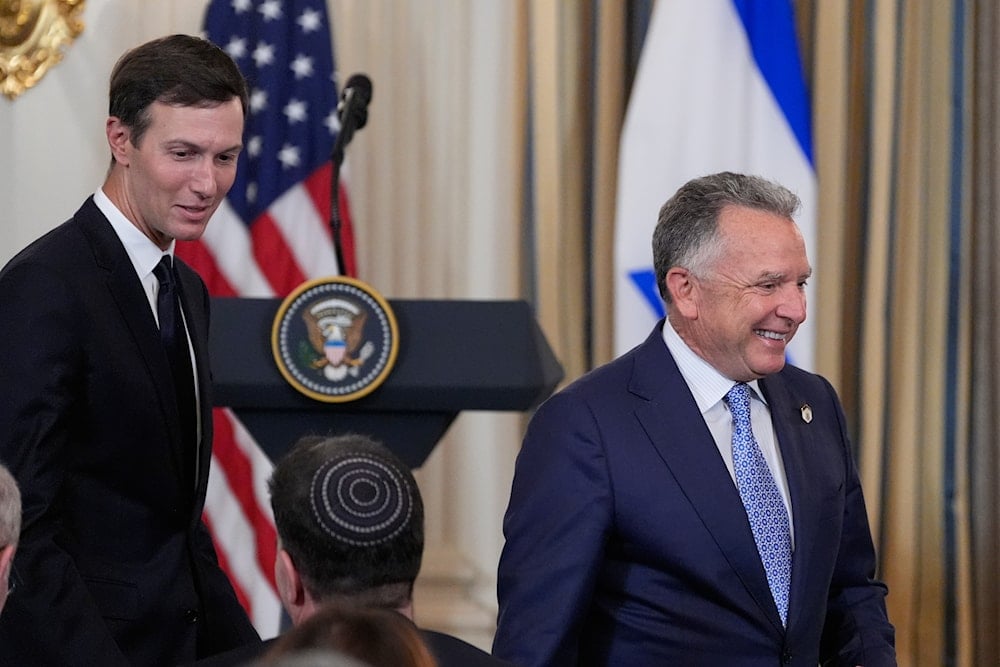Trump envoys Witkoff, Kushner head to Egypt to finalize Gaza deal
Trump's envoys, Jared Kushner and Steve Witkoff, are headed to Egypt to finalize Gaza ceasefire terms amid ongoing talks.
-

US Special Envoy to the Middle East Steve Witkoff and Jared Kushner arrive before President Donald Trump holds a news conference with Israeli Prime Minister Benjamin Netanyahu in the State Dining Room of the White House, Monday, Sept. 29, 2025 (AP)
US President Donald Trump's envoys, Steve Witkoff and Jared Kushner, are heading to Egypt today, Israeli Channel 12 reported on Friday, citing White House sources.
According to a White House official who spoke to AFP, Trump's son-in-law, Jared Kushner, and envoy Steve Witkoff were expected to finalize details on the release of captives and discuss a deal pushed by Trump to end the nearly two-year war on the Gaza Strip.
Egypt announces talks on Monday
Confirming the visit, the Egyptian Foreign Ministry announced that on Monday, Egypt will host Hamas and Israeli delegations for indirect talks to discuss the details of releasing all Israeli captives in exchange for Palestinian prisoners and detainees under Trump's plan.
The statement says the discussions are expected to hopefully lead to an end to the war in Gaza and to alleviating Palestinian suffering, which has been ongoing for two years.
Meanwhile, Israeli media reported that the Israeli delegation in Cairo may not depart until Monday, as the details are yet to be finalized.
Hamas accepts Donald Trump's captive exchange proposal
This follows Trump's call for "Israel" to halt its bombardment of Gaza, after Hamas announced it was ready to release all captives and begin negotiations on a ceasefire proposal.
Israeli forces continued air and artillery strikes on Gaza, despite reports of a unilateral ceasefire announcement, with witnesses describing an escalation in attacks targeting civilians, displaced persons, and humanitarian workers. Among the victims were two children killed in a drone strike on al-Mawasi in Khan Younis.
US President Donald Trump issued an ultimatum to Hamas, giving the Palestinian Resistance group until 6:00 pm Washington time on October 5 to accept his newly unveiled so-called Gaza "peace" proposal and warning that "all hell" will break loose should it refuse.
On October 3, Hamas submitted its official response to mediators regarding Trump's proposal for the Gaza Strip, with the movement announcing its willingness to release all Israeli captives, including both living detainees and remains, in accordance with the framework of the US-brokered plan.
Hamas emphasized that other elements of the proposal, particularly those concerning the future governance of Gaza and the rights of the Palestinian people, "are linked to a comprehensive national stance based on relevant international laws and resolutions."
Plan backed by 'Israel', built around US control
Unveiled last week in tandem with Israeli Prime Minister Benjamin Netanyahu, Trump's 20-point proposal presents Gaza's future as contingent upon Hamas' disarmament, the return of Israeli captives, and the establishment of a foreign-supervised administration. The plan envisions Gaza being transformed into a "demilitarized zone free of threats," overseen by a newly created international "Peace Council" chaired by Trump himself and including figures such as former British Prime Minister Tony Blair, whose legacy is tied to the Iraq and Afghanistan wars.
The proposal promises a comprehensive reconstruction program under Western and Gulf sponsorship, conditional on the complete dismantling of the Resistance's military infrastructure. It also claims to offer amnesty to Hamas members who agree to "coexistence" and renounce arms, while allowing others to leave Gaza through "safe corridors" to countries willing to receive them, a clause critics say amounts to forced expulsion.
Under the plan, Gaza's administration would shift to a non-political technocratic committee, operating under the Peace Council's supervision. A temporary international stabilization force, made up of US, Egyptian, Jordanian, and Palestinian police contingents, would be deployed to "secure borders" and manage the enclave's internal security.
Despite being touted by the Trump administration as a "last chance for peace," critics and UN experts condemn the proposal as a blueprint for Israeli control that denies Palestinians full sovereignty, excludes key factions like Hamas from governance, and risks creating an unstable, unjust peace reminiscent of colonial indirect rule.

 4 Min Read
4 Min Read










